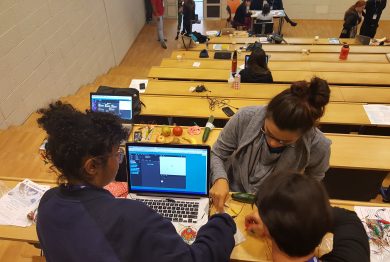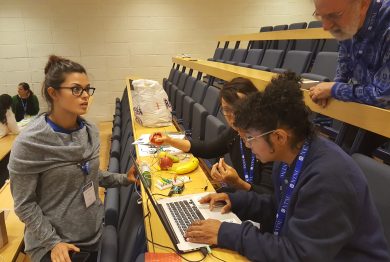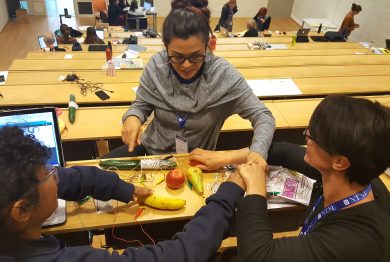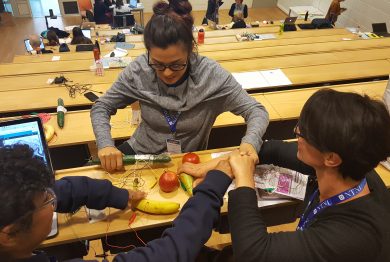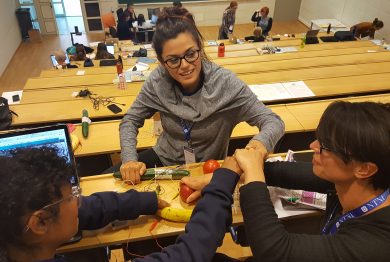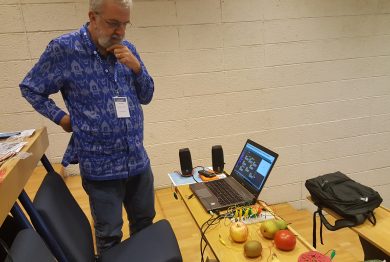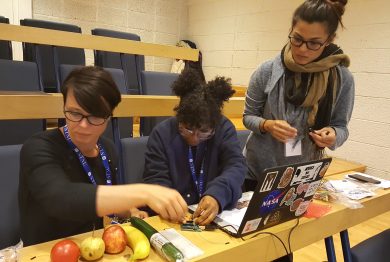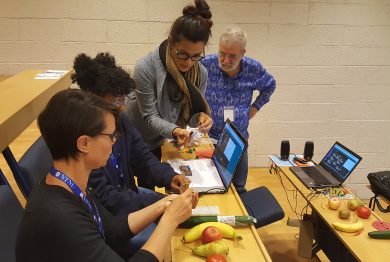IDC 2018 Workshop
CONSORTIUM EVENTS
IDC Workshop
Trondheim, Norway
19th June 2018

IDC Workshop: Papers
STEAM Learning in Formal & Informal Settings via Craft and Maker Projects Workshop
The first part of the workshop consists on demonstrations from the eCraft2Learn project partners, participant presentations and an audience-driven panel discussion.
The second half of the workshop focused on hands-on-tasks:
1) Activities piloted with children including technologies such as Raspberry Pis, Arduinos, sensors, and craft materials
2) Maker or physical computing activities that selected workshop participants would like to share.
The workshop was focused on pedagogic, cultural, and social issues in addition to the technical challenges of introducing Maker technology into schools and informal settings.
This workshop has merged with Sustaining Girls’ Participation in STEM, Gaming and Making.
Organizers
Dr. Ken Kahn is a researcher at the University of Oxford. He has been researching programming environments for children since he was a graduate student at the MIT AI Lab in the 1970s. He is the designer and implementer of several systems including ToonTalk, the Behaviour Composer, and MoPix, He has been actively publishing in the field of visual programming for over 25 years. For three winters he taught a course on computational thinking and modelling at the National University of Singapore. He is the lead on the eCraft2Learn efforts to enable students to build AI apps and artefacts.
Dr. Calkin Suero Montero is a senior researcher at edTech group, School of Computing, University of Eastern Finland. Dr. Suero Montero received her PhD in computer science from Hokkaido University, Japan (2008). Her main research interests are related to Human Language Technologies (HLT) applications such as conversational system; designing and implementing algorithms for text-based Affective Computing; investigating the social acceptance of novel human-computer interactions, such as gesture-based mobile interactions designs; and computer supported collaborative work in educational settings. Calkin is the eCraft2Learn project coordinator.
Dr. Christian Voigt has a degree in Business Informatics and a PhD in Information Systems (2008). He has extensive experience as project manager, researcher and lecturer in a number of countries (Austria, Germany, Australia and Singapore). His main expertise lies in the use of technology to enable digital innovations in education, workplaces and life in general (e-participation). Christian joined the Centre for Social Innovation in 2010, where he is leading the ‘Knowledge & Technology’ Unit since 2012. Over the past years, he has been actively involved in European research projects related to educational technology, research e-infrastructures and foresight studies. Currently, Christian is working on social innovations promoting e-inclusion (crowdsourcing geo-data) and promoting learning networks in maker communities. In the field of academia, he teaches at the University of Vienna (‘Information technology and society’ and ‘Didactical design’) and at the Danube University Krems (‘P2P for Social Innovation’).
Dr. Nuno Otero is an Associate Professor at the Computer Science and Media Technology Department of the Faculty of Technology at Linnaeus University (LNU) in Sweden. He is interested on theories and conceptual frameworks in Human-Computer Interaction, from more traditional approaches taking a user centred perspective to more recent trends focusing on user’s experiences with technologies. In a nutshell, the question driving his research concerns the understanding of how the properties of distinct devices, computational artefacts and embedded external representations impact on people’s activities (from work related activities to educational and ludic contexts).
Dr. Marcelo Milrad, PhD is a Full Professor of Media Technology at the Faculty of Technology at Linnaeus University (LNU) in Sweden. He is also the director of the Center for Learning and Knowledge Technologies (CeLeKT). His current research interests include the design of learning environments to support learning about complex domains, collaborative discovery learning and the development of mobile and wireless applications to support collaborative learning. During the last years he has been serving as a program committee member in a number of international scientific conferences such as CSCL, ICALT, WMUTE, ICCE and mLearn. He is also an editorial board member in several scientific journals in the field of Technology Enhanced Learning. He has acted as an executive member of the IEEE Computer Society Technical Committee on Learning Technology (LTTC) and he is one of the initiators of the IEEE International Conference on Wireless and Mobile Technologies in Education (WMTE).


